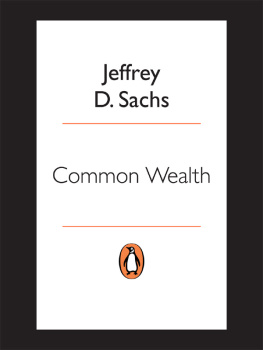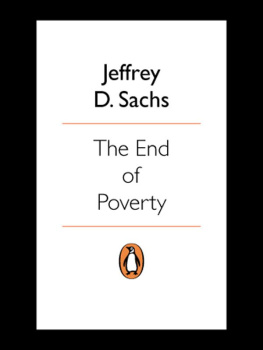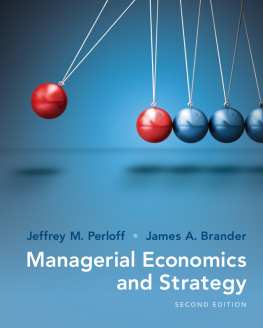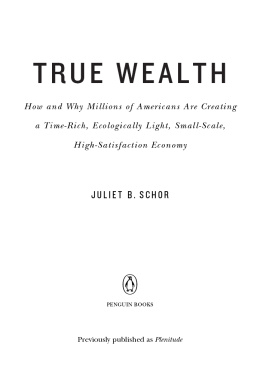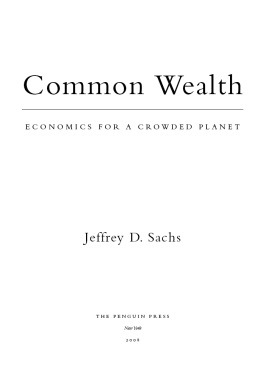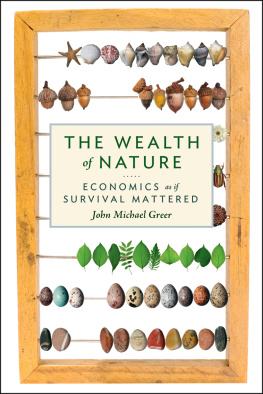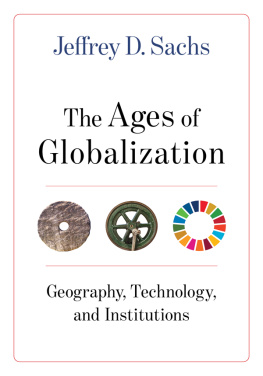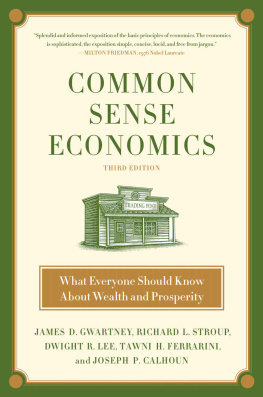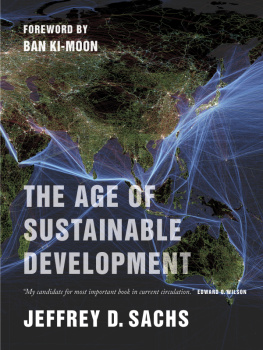Jeffrey Sachs - Common Wealth: Economics for a Crowded Planet
Here you can read online Jeffrey Sachs - Common Wealth: Economics for a Crowded Planet full text of the book (entire story) in english for free. Download pdf and epub, get meaning, cover and reviews about this ebook. year: 2011, publisher: Penguin Books Ltd, genre: Politics. Description of the work, (preface) as well as reviews are available. Best literature library LitArk.com created for fans of good reading and offers a wide selection of genres:
Romance novel
Science fiction
Adventure
Detective
Science
History
Home and family
Prose
Art
Politics
Computer
Non-fiction
Religion
Business
Children
Humor
Choose a favorite category and find really read worthwhile books. Enjoy immersion in the world of imagination, feel the emotions of the characters or learn something new for yourself, make an fascinating discovery.
- Book:Common Wealth: Economics for a Crowded Planet
- Author:
- Publisher:Penguin Books Ltd
- Genre:
- Year:2011
- Rating:5 / 5
- Favourites:Add to favourites
- Your mark:
- 100
- 1
- 2
- 3
- 4
- 5
Common Wealth: Economics for a Crowded Planet: summary, description and annotation
We offer to read an annotation, description, summary or preface (depends on what the author of the book "Common Wealth: Economics for a Crowded Planet" wrote himself). If you haven't found the necessary information about the book — write in the comments, we will try to find it.
Common Wealth: Economics for a Crowded Planet — read online for free the complete book (whole text) full work
Below is the text of the book, divided by pages. System saving the place of the last page read, allows you to conveniently read the book "Common Wealth: Economics for a Crowded Planet" online for free, without having to search again every time where you left off. Put a bookmark, and you can go to the page where you finished reading at any time.
Font size:
Interval:
Bookmark:

PENGUIN BOOKS
Sachs corrals the facts into clear and compelling arguments that will leave you keen to sign up to his grand plan and be part of bringing it about. The result is a truly inspirational book
Robert Matthews, BBC Focus
Never has the challenge of saving the world felt as simple
Edmund Conway, Daily Telegraph
Lively, provocative and readable will make the world a better place
Tim Congdon, Spectator
Genuinely impressive Sachs stands in the great tradition of campaigning intellectuals and has been an effective advocate of urgent policy action
Diane Coyle, Independent
A manifesto for securing a bright future for Earth
Michael Sargent, Nature
Packed with statistics and carefully worded arguments
Economist
A vital read Common Wealth is full of big ideas and is written by a star in the constellation of gurus a serious book that deserves to be widely read and debated Management Today
One of Americas most prominent economists Noel Malcolm,
Sunday Telegraph
Common Wealth explains the most basic economic reckoning that the world faces Despite the rearguard opposition of some vested interests, policies to help the worlds poor and the global environment are in fact the very best economic bargains on the planet
Al Gore
Jeffrey D. Sachs is Director of the Earth Institute and Quetelet Professor of Sustainable Development at Columbia University, and the global bestselling author of The End of Poverty. He is internationally renowned for his work as an economic adviser to governments around the world and is a special adviser to United Nations Secretary-General Ban Ki-moon on the Millennium Development Goals. He was the BBCs Reith Lecturer for 2007 and presented some of the ideas in this book to a worldwide radio audience during those lectures.
Economics for a Crowded Planet

PENGUIN BOOKS
PENGUIN BOOKS
Published by the Penguin Group
Penguin Books Ltd, 80 Strand, London WC2R 0RL , England
Penguin Group (USA), Inc., 375 Hudson Street, New York, New York 10014, USA
Penguin Group (Canada), 90 Eglinton Avenue East, Suite 700, Toronto, Ontario, Canada M4P 2Y3 (a division of Pearson Penguin Canada Inc.)
Penguin Ireland, 25 St Stephens Green, Dublin 2, Ireland (a division of Penguin Books Ltd)
Penguin Group (Australia), 250 Camberwell Road, Camberwell, Victoria 3124, Australia (a division of Pearson Australia Group Pty Ltd)
Penguin Books India Pvt Ltd, 11 Community Centre, Panchsheel Park, New Delhi 110 017, India
Penguin Group (NZ), 67 Apollo Drive, Rosedale, North Shore 0632, New Zealand (a division of Pearson New Zealand Ltd)
Penguin Books (South Africa) (Pty) Ltd, 24 Sturdee Avenue, Rosebank, Johannesburg 2196, South Africa
Penguin Books Ltd, Registered Offices: 80 Strand, London WC2R 0RL , England
www.penguin.com
First published in the United States of America by The Penguin Press, a member of Penguin Group (USA) Inc. 2008
First published in Great Britain by Allen Lane 2008
Published in Penguin Books 2009
Copyright Jeffrey D. Sachs, 2008
The moral right of the author has been asserted
All rights reserved
Without limiting the rights under copyright reserved above, no part of this publication may be reproduced, stored in or introduced into a retrieval system, or transmitted, in any form or by any means (electronic, mechanical, photocopying, recording or otherwise), without the prior written permission of both the copyright owner and the above publisher of this book
ISBN: 978-0-14-191931-7
For Lisa, Adam, and Hannah,
my three best reasons for hope
D RAWING FROM HIS UNEXCELLED EXPERIENCE and knowledge, Jeffrey D. Sachs has written a state of the world report of immediate and enormous practical value. Common Wealth: Economics for a Crowded Planet delivers what the title promises: a crystal-clear analysis, a synthesis, a reference work, a field manual, a guidebook, a forecast, and an executive summary of recommendations fundamental to human welfare. It says to those responsible for Earths 6.6 billion people: Just look at the numbers. The world has changed radically in the past several decades; it is going to change more, faster and faster. In spite of all we have accomplished through science and technologyindeed because of itwe will soon run out of margin. Now is the time to grasp exactly what is happening. The evidence is compelling: we need to redesign our social and economic policies before we wreck this planet. At stake is humankinds one shot at a permanently bright future.
Modern humanity was born, so to speak, about ten thousand years ago with the invention of agriculture and the villages and political hierarchies that soon followed. Up to that point our species had perfected hunter technology enough to wipe out a large part of Earths largest mammals and birdsthe megafaunabut it left most of the vegetated land surface and all of the oceans intact. The economic history that followed can be summarized very succinctly as follows: people used every means they could devise to convert the resources of Earth into wealth. The result was steady population growth accompanied by expansion in geographic range, sustained until virtually every habitable parcel of land was occupied, to as much a level of density as technology and disease resistance permitted. By 1500 the exponential form of the surge was obvious. By 2000 it had produced a global population dangerously close to the limit of Earths available resources. The key trait of human economic advance has always been exponential growth: that is, with each increase, that same amount of increase is next attained sooner. The simple command humanity has followed is biological in nature: be fruitful and multiplyin every way try to be exponential. More precisely, the growth is logistic: it is exponential until it slows and tapers off because of restraints imposed by the environment.
As the large mass of data summarized in Common Wealth shows with sobering clarity, we have arrived at a narrow window of opportunity. Humanity has consumed or transformed enough of Earths irreplaceable resources to be in better shape than ever before. We are smart enough and now, one hopes, well informed enough to achieve self-understanding as a unified species. If we choose sustainable development, we can secure our gains while averting disasters that appear increasingly imminent.
Please look at the numbers, then, in Common Wealth. Extrapolate a bit. We still can correct the course, but we do not have much time left to do it.
Almost all of the crises that afflict the world economy are ultimately environmental in origin: they prominently include climatic change, pollution, water shortage, defaunation, decline of arable soil, depletion of marine fisheries, tightening of petroleum sources, persistent pockets of severe poverty, the threat of pandemics, and a dangerous disparity of resource appropriation within and between nations.
Unfortunately, while each of these problems is understood to some degree by decision makers, they typically continue to be addressed as separate issues. Yet the world has little chance to solve any one, Sachs shows, until we understand how all of them connect by cause and effect. We will be wise to look upon ourselves as a species and devise more realistic and pragmatic approaches to all the problems as a whole.
Font size:
Interval:
Bookmark:
Similar books «Common Wealth: Economics for a Crowded Planet»
Look at similar books to Common Wealth: Economics for a Crowded Planet. We have selected literature similar in name and meaning in the hope of providing readers with more options to find new, interesting, not yet read works.
Discussion, reviews of the book Common Wealth: Economics for a Crowded Planet and just readers' own opinions. Leave your comments, write what you think about the work, its meaning or the main characters. Specify what exactly you liked and what you didn't like, and why you think so.

